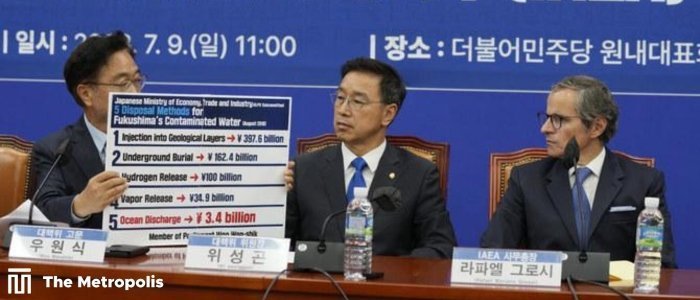Main opposition Democratic Party lawmaker Woo Won-shik, left, shows a list of proposed disposal methods for the Fukushima contaminated water as his party lawmaker Wi Seong-gon and Rafael Mariano Grossi, Director General of the International Atomic Energy Agency, right, look on July 9, 2023. (AP)
Metropolis Desk-
During a tense meeting in Seoul on Sunday, with demonstrators yelling outside the door, South Korean opposition MPs severely chastised the head of the United Nations nuclear watchdog for its approval of Japanese plans to release treated effluent from the wrecked Fukushima nuclear power plant.
The director general of the International Atomic Energy Agency, Rafael Mariano Grossi, arrived in South Korea over the weekend to interact with opposition figures and officials and allies of the regime, as well as to allay public worries about the safety of their food. After the IAEA last week authorized the Japanese discharge plans, claiming that the procedure will exceed international safety requirements and have minimal effects on the environment and human health, the scheduled release of the Fukushima plant’s treated wastewater became a significant political issue in South Korea.
The South Korean government has also backed the safety of the Japanese plans, stating that as long as the plant’s treatment systems operate as intended, the contamination levels of water pumped out from the facility would be within acceptable criteria and wouldn’t significantly damage South Korean waters.
Grossi said that the IAEA’s evaluation of the Japanese proposals was founded on “transparent” and “scientific” study at a meeting with visiting members of the liberal Democratic Party, which holds a majority in South Korea’s parliament. He acknowledged worries about how the Japanese plans would work out and said that the IAEA will open a permanent office in Fukushima to carefully watch how the discharge procedure is carried out over the course of the next 30 years.
The legislators responded by sharply criticizing the IAEA’s evaluation, which they claim ignored the long-term environmental and health effects of the wastewater release and poses a threat to create a dangerous precedent that could inspire other nations to dispose of nuclear waste in the ocean. They demanded that Japan abandon its intentions to discharge sewage into the ocean and instead cooperate with its neighbors to develop better methods of handling the wastewater, possibly even looking into the possibility of long-term land storage.
The Yoon Suk Yeol administration of South Korea has also come under fire from the party for endangering the health of its citizens to strengthen ties with Japan.
“If you think (the treated wastewater) is safe, I wonder whether you would be willing to suggest the Japanese government use that water for drinking or industrial and agricultural purposes, rather than dumping it in the sea,” Woo Won-shik, a Democratic Party lawmaker who attended the meeting, told Grossi. The party said Woo has been on a hunger strike for the past 14 days to protest the Japanese discharge plans.
Further details from the meeting weren’t immediately available after reporters were asked to leave following opening statements. Dozens of protesters shouted in a nearby hall while holding signs denouncing the IAEA and Japan, and they were closely watched by parliamentary security staff.
Hundreds of demonstrators had also marched in downtown Seoul on Saturday demanding that Japan scrap its discharge plans. Those protests provided a tense backdrop to a meeting between Grossi and South Korean Foreign Minister Park Jin, who called for IAEA’s “active cooperation” in reassuring the South Korean public.
The safety of Fukushima’s wastewater has been a sensitive issue for years between the US allies. South Korea and Japan have been working in recent months to repair relations long strained over wartime historical grievances to address shared concerns such as the North Korean nuclear threat and China’s assertive foreign policy.
South Korea’s assessment of the safety of the discharge plan was partially based on observations by a team of government scientists who were allowed to tour the Fukushima plant in May. Japanese Prime Minister Fumio Kishida had agreed to that visit during a May 7 summit with Yoon in Seoul, in a show of his desire for improved ties.
In a statement released by state media on Sunday, North Korea also criticized the Japanese discharge plans, warning against a “fatal adverse impact on the human lives and security and ecological environment” resulting from the discharge of “nuclear-polluted water.” The statement, which was attributed to an unidentified official in North Korea’s Ministry of Land and Environment Protection, also criticized Washington and Seoul for backing the Japanese plans.
“What matters is the unreasonable behavior of IAEA actively patronizing and facilitating Japan’s projected discharge of nuclear-polluted water, which is unimaginable,” it said. “Worse still, the US and (South) Korea openly express unseemly ‘welcome’ to Japan’s discharge plan that deserves condemnation and rejection, provoking strong anger of the public.”
A massive earthquake and tsunami in 2011 destroyed the Fukushima plant’s cooling systems, causing three reactors to melt and release large amounts of radiation.
Tokyo Electric Power Company Holdings, which runs the facility, has been storing the cleaned water in hundreds of tanks, which currently encircle much of the complex and are almost full. To establish facilities for the plant’s decommissioning and to reduce the risk of leaks in the event of another severe accident, according to Japanese officials, the tanks must be removed. Early in 2024, the tanks should attain their 1.37-million-ton capacity.
In 2018, Japan first announced plans to release the treated water into the ocean, stating that the process would take decades to complete and that the water would be further diluted by seawater before being released.
Source- Arab News



